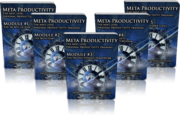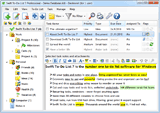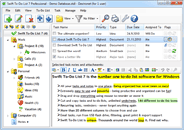Since publishing my super-popular post “Are you a Zen Coder or a Distraction Junkie“, I’ve been doing some more research.
So… do you ever wonder why you can’t get anything done?
Well, Julie Morgenstern, the #1 USA professional organizer, explains what new research revealed:
According to a study published by Cubesmart Inc., we experience on average, one interruption every 8 minutes or approximately 6-7 per hour.
That equals about 50-60 interruptions in an 8 hour day.
Most interruptions take approximately 5-15 minutes. If you receive 50 interruptions daily and each takes 10 minutes, that totals 500 minutes, which is 8 hours per day.
Ouch! No wonder you feel the need to work 12 hours per day… 8 handling interruptions, and 4 getting your work done after hours.
Sobering, isn’t it? Or, consider this study:
“In a recent study, a group of Microsoft workers took, on average, 15 minutes to return to serious mental tasks, like writing reports or computer code, after responding to incoming e-mail or instant messages. They strayed off to reply to other messages or browse news, sports or entertainment Web sites.”
The bottom line is this -
DISTRACTION equals DESTRUCTION …of productivity and your future career and success in life.
Interruptions and distractions are the #1 reason why we can’t get anything done in the office.
Yes, you can use all sorts of fancy productivity techniques, but as long as people and things keep distracting and interrupting you, you won’t accomplish anything. It will be impossible.
You are either distraction-driven, or productive. Your mind is either scattered all over the place, or focused.
It’s your career and future at stake here. It’s a very serious problem – and most people don’t have a clue about it.
Fortunately, here are 5 action steps you can do right now to turn things around -
You absolutely need to get rid of as many interruptions and distractions as possible, immediately. And this is what you need to do -
- Disable all popups and notifications – on your computer, phone, tablet. Everywhere. Be brutal.
- Start explaining to your co-workers that when they need something, they should email you. Be polite but firm and persistent. Also tell them that calling you or walking to your desk should be used only in important urgent matters.
- Check your email only twice a day. Keep your email closed the rest of the day. This is key.
- Keep your phone on vibrate if possible. And remember: You don’t have to pick up the phone just because it rings.
- Don’t “train” others to expect your response immediately in trivial matters. If it takes you 24+ hours to reply to an email, they will learn to obtain the information themselves instead of contacting you all the time, sometimes unnecessarily.
Once you do these 5 things, you will make it possible for yourself to actually get something done!
Then, the next step is to schedule some un-interrupted blocks of time without distractions. Once you do that, you will be more productive than ever – and start going home sooner.
The perfect workflow
Your workday can look like this:
- Look at your to-do list to see what’s next
- Do it
- Mark it as complete in your to-do list
- Go to 1 and repeat
If your current workflow doesn’t look anything like that, well, blame the distractions and interruptions.
PS: Psssst. Let me tell you a secret — ready? — YOU are the one who is allowing the distractions and interruptions into your life. You are responsible. I suggest you take control of your work environment and life back into your hands – today.
You can start by removing the “email drug” needle from your arm, disabling all notifications, and training your co-workers to stop interrupting you all the time.






Hm. While I think some of the points made here are defensible, there are many that don’t ring true.
For example:
- Ms. Morgenstern’s analysis showing 6-7 interruptions per hour adding up to 8 hours per day has too many assumptions and holes. What is an interruption? How many interruptions are casual versus the nature of your business? What roles did the sample play in this claim?
I agree distractions are distracting – this claim reduces my confidence in her assertion.
You follow-up with 5 things we can do to mitigate.
#1: Disabling non-essential notifications, such as Facebook friending, makes sense. But disabling text messages or email notifications from your co-workers or boss are probably not good moves.
#2: I can go with your comment here…
#3: Limited yourself to 2 checks of email a day is not practical for many professional positions. Like it or not, email is the predominant way of communicating in professional, distributed, or large organizations. It can be a career-limiting move to wait until the end of the day to check on the urgent-stamped message the boss sends you in the morning.
#4: Also agree here.
#5: I very much agree here.
Definitely thought-provoking. I personally would steer away from putting the onus on the reader that he/she is the one allowing distractions. I get what you’re trying to say, though, and I would agree that the individual can do more to set better “rules of engagement” when it comes to productivity.
>>>> Dan
Hi Dan,
You’ve made some good points.
Ad: #1 and #3:
Of course, not every professional can check email just twice per day
The main point here is to have a schedule (plan) for checking the email, whether it’s 2 times per day, or 10 times per day. The main idea is that you shouldn’t check it compulsively/obsessively – that’s detrimental to productivity.
Likewise, real-time popups break focus.
One of the reasons I advocate for working in long, un-interrupted blocks of focused time is that being reactive to real-time notifications, mutli-tasking and context switching can have long-term negative impact on mental skills – these things are essentially the opposite of meditation. They train you to have short attention span.
Hi Jiri,
First of all thank you. Thank you for writing what I try to tell people in a clear and convincing one-pager (it typically takes me a lot longer and then I fail ;)
To me this one close to wraps it up. I also love a Dutch short write up on setting goals way easier than the classic systems do, unfortunately I can not refer to it unless you speak Dutch.
But as to Zen your productivity I would like to point out one article from a Dutch productivity coach who goes the mile on this topic. I have learnt a lot from it and use it to train people to shut their phones up. Do check out http://timemanagement.nl/give-your-smartphone-some-zen-time/ .
I am currently trying to get corporates to turn OFF new email notifications by default, so you don’t get them unless you change it. Work in progress but if you know of any success stories here I would much appreciate it.
Kind regards, Richard
Owner Email Handyman and creator Braintoss
http://workshop.emailhandyman.com
http://www.braintoss.com
Whoever wrote this has never dealt with people. Probably Has no children. And no relationships. Or they’re typing this advice thinking that’s the answer and they haven’t tried living it out. The truth is much of the work we do anymore is people oriented. I can’t sit at my computer and passive aggressively pretend my coworker isn’t stopping by to asks question cause I’m too focused. Anyone who does this will learn the hard way. You have to get stuff done and you have to deal with interruptions with grace. The only way to train others to leave you alone is to train a culture of focus. Teach that person to be more focused and they will leave you alone and appreciate your space and you will have made a friend and not alienated someone. if you set your mind to achieve achieve achieve everyone you work with will hate you…seek to destroy you and all your nose to the grindstone crap will have been for nothing. Theres no black and white answer to questions like these. Be a good person. And adopt an always learning always teaching mindset.
Hi Jared,
I guess it depends on the kind of work you do. If it’s your job to create something, I think it is reasonable to have others interrupt you only during scheduled times, or for you to reply to emails only during specified times of the day.
I fully agree with this article. I get too many distractions a day and it really cripples my productivity. It’s important to not only train yourself to be accountable for how many interruptions you allow into your day but to train others by how you react to those interruptions.
Good info!
O_o; Not when your browser decides to die and to be able to get back to work you have to figure out what caused the problem It’s not always the persons fault.